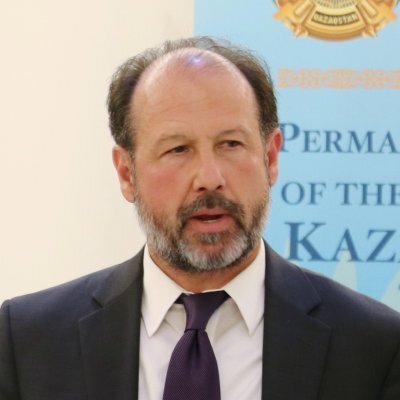Delay in restoring JCPOA is extremely regrettable: Daryl G. Kimball

TEHRAN - Daryl G. Kimball, executive director of the Arms Control Association (ACA), says a delay by Iran and the U.S. to return to their commitments under the 2015 nuclear deal is “extremely regrettable”.
Kimball believes this will not meet the interests of the two countries and the international community at large.
“The delay in restoring compliance is extremely regrettable and does not advance the interests of the United States, Iran, or the international community,” Kimball tells the Tehran Times in an exclusive interview.
The prospects to revive the nuclear deal, officially known as the Joint Comprehensive Plan of Action (JCPOA), is now looking grimmer than ever before.
Negotiations to put the JCPOA on the right track started in April 2021 but they have stalemated since March due to certain reasons, including a refusal by the Biden administration to remove the Islamic Revolution Guards Corps (IRGC) from the U.S. list of Foreign Terrorist Organizations (FTO).
“The indirect talks between the representatives of the Islamic Republic of Iran and the United States on restoring mutual compliance with the JCPOA have actually produced some good results that will, if implemented, produce win-win results for all involved. Yet the two sides have failed to reach agreement on one issue outside the terms of the JCPOA itself: the Iranian demand to lift the U.S. Foreign Terrorist Designation on the IRGC,” Kimball states.
Donald Trump quit the JCPOA in May 2018 and returned the sanctions lifted under the agreement. His administration added new sanctions under different names in line with his “maximum pressure” campaign against Iran. A year later, Iran started to gradually lift bans on its nuclear activities as the remaining parties to the agreement, mainly the European trio of Germany, France and Britain, failed to compensate Iran for the U.S. sanctions.
The executive director of the ACA says, “The ongoing imposition of U.S. sanctions on Iran that had been lifted in 2016 when Iran met the terms of the JCPOA has made life more difficult for ordinary Iranians, and the acceleration of the Iranian nuclear program since 2019.”
Kimball also suggests that Iran should provide answers to the IAEA about alleged secret nuclear activities in the past.
The Iranian ambassador to the Vienna-based IAEA has said the new report by the Agency about Tehran’s nuclear program is one-sided and fails to reflect Iran's considerable cooperation with the UN body.
Moreover, Iran has been insisting that it has no intention to produce nuclear arms. Supreme Leader of the Islamic Revolution has also declared a fatwa (religious decree) banning production, stockpiling and use of nuclear arms.
“The failure of the Iranian government to address lingering questions from the International Atomic Energy Agency regarding some of its past military-related nuclear activities, has once again increased concerns that Iran has ambitions to produce nuclear weapons. This is a lose-lose situation that will only get worse for both sides if they don’t find a way to restore mutual compliance with the JCPOA,” the chief of the Washington-based ACA points out.
‘If U.S. and Iran are truly interested in restoring JCPOA, there is a suitable compromise that can be negotiated’
He proposes solutions to get out of such an imbroglio, saying, “One way to do so would be for the United States to lift the FTO designation on the IRGC and in exchange, for the Iranian government to provide assurances that American officials or citizens will not be targeted by Iranian forces or proxies supported by Iran.”
Experts as well as some former and current officials, including former EU foreign policy chief Javier Solana, former Swedish prime minister Carl Bildt and U.S. Republican Senator Rand Paul, believe that the designation against the IRGC is largely symbolic. Kimball also believes so and says such a disagreement should not prevent the two sides to return to the JCPOA.
“Indeed, the U.S. FTO designation of the IRGC is largely symbolic, which is why neither side should (put) all their current disagreement on this issue to stand in the way to delivering meaningful sanctions relief for the Iranian people and the Iranian economy or bringing Iran’s sensitive nuclear activities back within the agreed limits of the 2015 nuclear deal so as to assure the international community that Iran is not seeking to acquire the capacity to produce nuclear weapons, which would violate the nuclear Nonproliferation Treaty as well as the Supreme Leader’s fatwa against nuclear weapons,” he notes.
Kimball, who has led the association’s education, research, and policy advocacy campaigns on a range of issue, goes on to say, “If both sides are truly interested in restoring the JCPOA and reducing tensions over Iran’s nuclear program, there is a suitable compromise that can be negotiated. But it will take both sides to meet each other halfway and it will require continued and more intensive negotiations on the matter.”
He also believes that a resurrection of the JCPOA can lay the groundwork for the U.S. and Iran to diplomatically resolve remaining differences related to the West Asia region and also establish “cultural exchanges” to the benefit of American and Iranian citizens.
“I believe the JCPOA can and will be revived because it still serves the supreme national interests of Iran and the international community and creates a necessary foundation for the diplomatic resolution of a range of other issues and concerns and disputes regarding the establishment of peace and security in the Middle East region, and it can help smooth the pathway to renew cultural exchanges and humanitarian support that enriches the lives of ordinary citizens in Iran, in the United States, and in the region,” Kimball concludes.
Leave a Comment